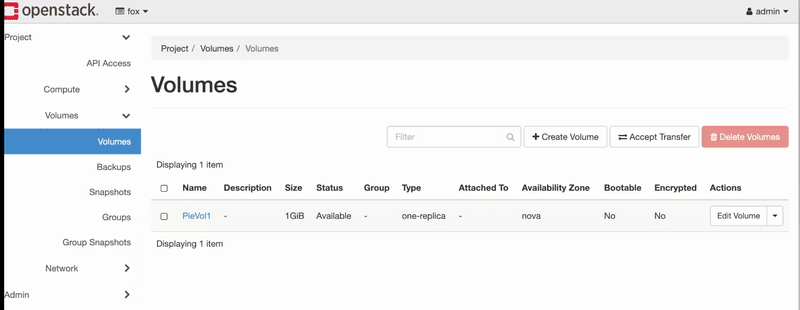We are excited to announce the release of Lightbits v3.14.1 software-defined storage, bringing a host of new features and improvements across usability, automation, scalability, and ecosystem integration.
At Lightbits, we’re proud to empower some of the world’s largest AI clouds, Financials and eCommerce market giants, who trust us to run high-density, low-latency and high-throughput workloads – whether on bare-metal, Kubernetes, OpenShift, OpenStack, or other modern infrastructure platforms.
With this release, we continue to evolve the platform to eliminate bottlenecks, simplify operations, and deliver the integration and performance demanded by today’s data infrastructure environments.
Whether you manage clusters via CLI, integrate with OpenStack, or operate at large scale, v3.14.1 delivers the enhancements you need.
Key Highlights of Lightbits v3.14.1 (STS)
Strengthened OpenStack Integration
We continue to deepen our integration with the OpenStack ecosystem, giving storage administrators the tools they need to support modern, multi-tenant workloads:
- Quality of Service (QoS): Define performance policies, such as IOPS and bandwidth limits, for predictable application performance.
- Multi-Tenancy Support: Added multi-tenancy capabilities for block storage environments, allowing multiple independent users or tenants (projects) to securely share the same storage infrastructure while maintaining data isolation, access controls, and performance consistency.
- Volume Retype Support: Seamlessly change the performance profile or replication settings of existing volumes, without data migration or downtime.
You can read more about OpenStack integration with Lightbits here.

Above: Creation of a QoS policy in Lightbits (top) and applying that policy to a volume type in OpenStack (bottom)

Above: Changing LB volume replication factor from 1 replica to 3 using OpenStack’s volume type change operation
Scalability Enhancements
Key features in this release enhance Lightbits’ performance in large-scale deployments:
Up to 259K Client Connections: We have increased the number of connections per cluster, enabling each node to support thousands of concurrent client I/O connections while gracefully rejecting excess connections.
Smarter AI Assistant in LBCLI
In this release, the lbcli ask AI assistant is even more powerful and robust. It now supports follow-up questions, allowing you to maintain context during a session. This enhancement makes your command-line experience more natural, conversational, and productive, especially when troubleshooting or exploring complex configurations.

Above: Using LBCLI ask in natural language to create, modify and delete a Lightbits volume.
Security and Automation Enhancements
Also included in this release are meaningful upgrades to help you better secure, manage, and repurpose your environment:
New Encryption Event Types: Encryption-related issues, such as TPM initialization failures or KEK access problems, now trigger dedicated event codes, making it easier to pinpoint and resolve setup issues.
Clearer Encryption Lifecycle Monitoring: Events now track when cluster encryption is initiated and completed, offering clearer operational visibility.
JWT Token Parsing Built-In: The new parse jwt command in LBCLI lets you decode and inspect JWT tokens directly from the command line – great for debugging authentication flows.

Above: LBCLI parse JWT command in action for the default JWT and for a JWT provided as a command line parameter.
Ansible cleanup_all Option: A new flag in the Lightbits Ansible role allows you to fully wipe and clean a previously installed server, enabling easy reinstallation and reuse. This is ideal for lab environments, automation pipelines, or test cycles.
Together, these updates simplify secure deployments and improve operational flexibility.
New LTS (Long Term Support) Version Available: Lightbits v3.12.2
In addition to v3.14.1, we’ve also released Lightbits v3.12.2, now designated as our latest Long-Term Support (LTS) version. It includes a range of important bug fixes and improvements.
Not sure whether to choose LTS or our more frequent STS (Short-Term Support) releases? We’ve got you covered. Check out this guide on how to choose the right Lightbits release to help you decide which stream best fits your needs.
The full release notes for v3.12.2 are available here.
Looking Ahead
With each software release, Lightbits gets more robust, scalable, and user-friendly across both enterprise and cloud-native platforms. From CLI-powered AI automation to OpenStack integration and deeper encryption insights, we are delivering meaningful improvements that align with how you manage data.
We are especially proud of our role in empowering some of the world’s largest AI clouds, eCommerce leaders, and organizations that demand exceptional performance and resiliency at scale. Supporting these demanding environments motivates us to keep pushing the boundaries of what’s possible in software-defined storage.
We would love to hear your feedback! Explore the new features, try them in your environment, and let us know how they’re working for you. And as always, don’t forget to join the Lightbits User Community Hub – our growing community on Slack where users, partners, and engineers connect and collaborate.
The full release notes for v3.14.1 are available here.

